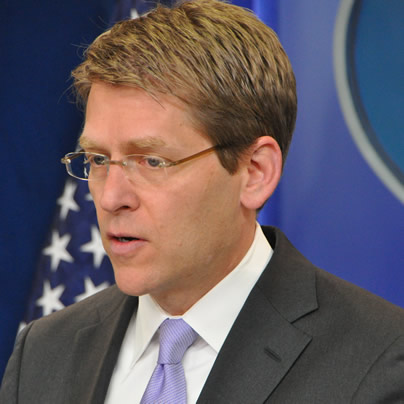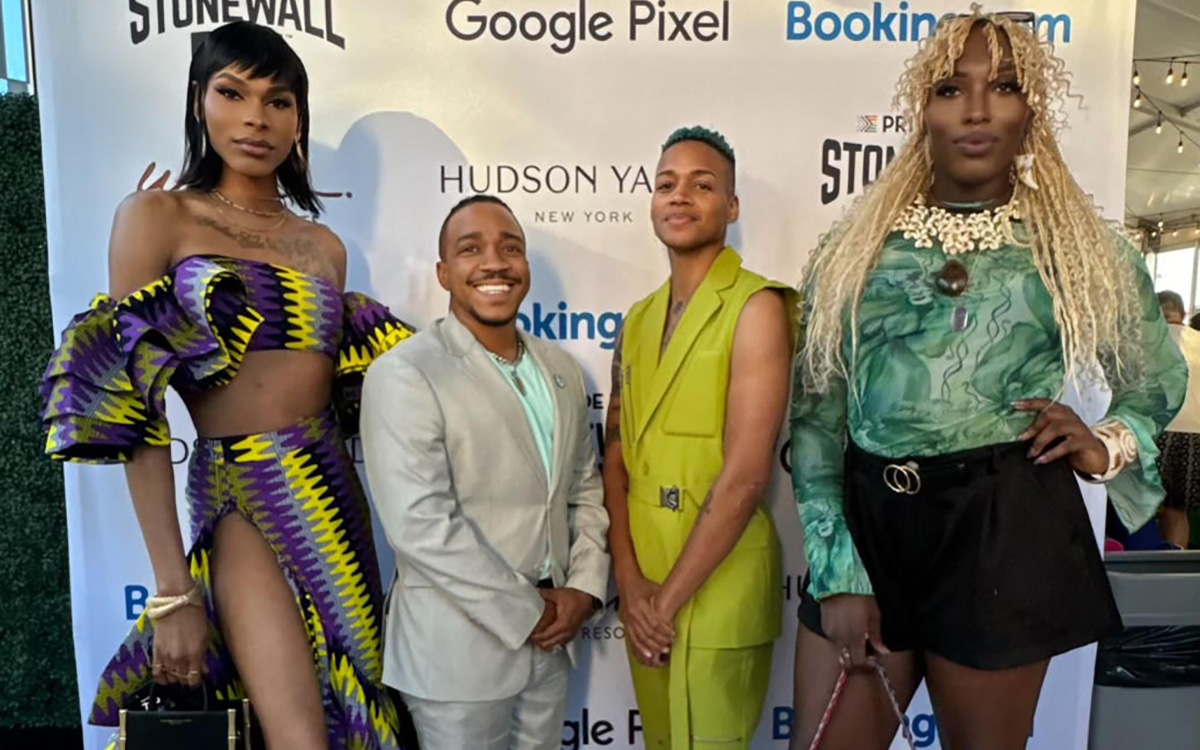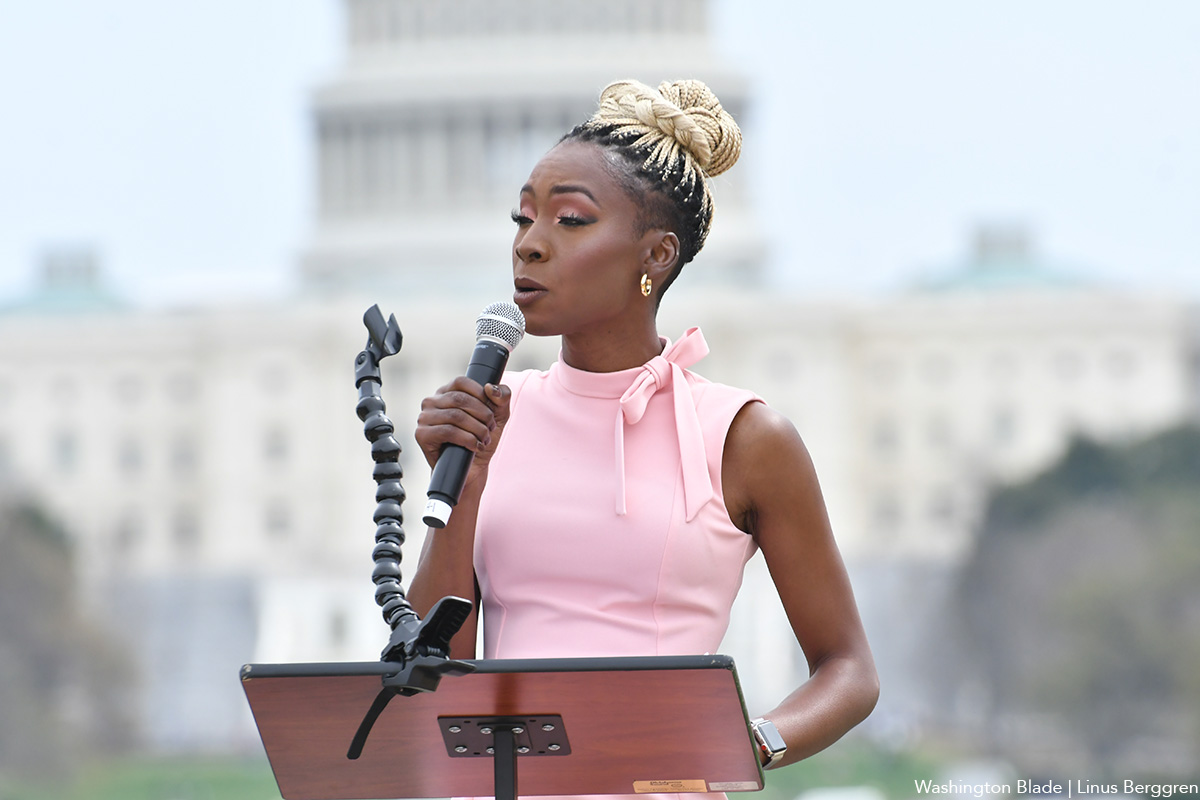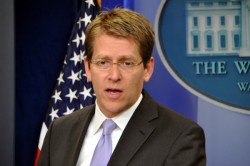National
Still more marriage questions for Carney
W.H. won’t say whether Obama wants marriage in Dem platform or help in state efforts

White House Press Secretary Jay Carney faced new questions on marriage Thursday in the first time the spokesperson publicly talked to reporters following President Obama’s announcement in support of same-sex marriage.
In a press gaggle abord Air Force One en route to Seattle, Carney declined to answer inquiries on whether Obama wants to see an inclusion of same-sex marriage in the Democratic Party platform, nor would he would say whether Obama will commit to helping with efforts to pass same-sex marriage in states.
Asked whether Obama will move toward having “pro-gay marriage language in the Democratic national platform,” Carney deferred to the Democratic National Committee.
“Well, party platform issues are for the party to decide,” Carney said. “That process is underway, and I refer you to the DNC on the question about the platform.”
Carney similarly dodged in response to a question on whether Obama will be “outspoken when these issues come up in states” deliberating same-sex marriage.
“I’m not going to speculate about what he may say or statements he might issue,” Carney said. “He has on occasion made his position known on actions by individual states, most recently in North Carolina, and I’m sure that continues to be the case. That will continue to be the case.”
Evan Wolfson, president of Freedom to Marry, said in response to Carney’s answer on the Democratic platform that those crafting the document should listen the president’s endorsement of same-sex marriage on Wednesday.
“Freedom to Marry’s call for a freedom to marry plank in the Democratic Party — a call that has won huge support from former party chairs, the convention chair, leaders in Congress, 22 senators, and over 40,000 signers on our online petition — continues full force,” Wolfson said. “The Democratic Party should do what the president did so beautifully yesterday: stand for the freedom to marry.”
Wolfson similarly said the onus is on supporters or marriage equality to advance same-sex marriage throughout the nation in the wake of Obama’s endorsement.
“We know that the president’s strong voice and clear message yesterday will have an enormous and ongoing effect in helping people wrestling with this question rise to fairness,” Wolfson said. “It’s the job of all the rest of us to go out and have the conversations that he described so well as helping change his mind.”
John Aravosis, who’s gay and editor of AMERICAblog, said he’s OK with giving Obama a short break after his endorsement of same-sex marriage, but wants to see further action from the president.
“I’m happy to give the president twenty-four hours of honeymoon before I start demanding he do more on marriage, but I do think the community will expect him, and the party, to follow through on his support of same-sex marriage,” Aravosis said. “And that would mean adding marriage equality to the party platform and speaking out more aggressively against anti-gay measures in the states, including those concerning marriage.”
Carney also took questions on the web video ad the Obama campaign on Thursday hyping Obama’s newfound support of same-sex marriage and criticizing Romney for supporting a Federal Marriage Amendment and not even supporting civil unions.
A transcript of the exchange between reporters and Carney during the gaggle follows:
Q: Jay, today the Obama campaign put out a web video that’s attacking Romney on his stance on rights for same-sex couples. Given that the President just came around on this, on the issue of gay marriage yesterday, doesn’t that seem hypocritical and politically motivated more than anything?
Carney: Well, I would refer you to the campaign to talk about ads or videos that they put out. The president noted in his interview when it came up yesterday with Robin Roberts of ABC, that his opponent, Governor Romney, has a starkly different view of these issues, and a starkly different view of the policy issues, even prior to the president’s announcement yesterday that he had come to the conclusion that he personally supports same-sex marriage.
Gov. Romney is for an amendment to the U.S. Constitution that would enshrine discrimination into our founding legal document. The president thinks that’s wrong. So their positions were starkly different before yesterday.
Q: The campaign or the president —
Carney: If you want to ask the campaign about its tactics I think you ought to ask the campaign about its tactics. The president was very clear in his interview with Robin Roberts about what his personal beliefs are. The president’s record on these issues of supporting LGBT rights is long and impressive and clear, and he’ll continue to fight to expand and protect the rights of all American citizens.
Q: Can you tell us whom — after he gave his interview, to whom has the president spoken personally, both on the gay advocacy side, and also perhaps on the other side in terms of any religious leaders or people who might want to get an explanation from him about his stance?
Carney: I don’t have any conversations of the president to read out to you. The president had quite a busy day yesterday, and it continued to be busy after his interview.
Q: And do you suspect that at any point he would just point that out?
Carney: I wouldn’t — I couldn’t predict on that.
Q: Is the president excited to talk about this issue tonight now that he’s going to be doing a fundraiser in California among probably a lot of people who are very supportive of gay marriage? This is sort of the first chance he’ll have to talk about it since revealing his view.
Carney: I think the President has always been clear about his support for LGBT rights and the actions that he’s taken, including repealing “don’t ask, don’t tell”; the fact that he has long opposed the Defense of Marriage Act; the fact that he and the Attorney General, and therefore the administration, have deemed Section 3 of DOMA to be unconstitutional, and therefore the decision not to continue to defend it.
But look, the President’s focus, as I think he also said yesterday in his interview, has been and will continue to be on jobs and the economy. That’s been the — creating greater security for a middle class in this country that has been under stress for a long time, even predating the Great Recession, has been number-one priority. It was his number-one priority when he ran for office, for this office, and it has been his priority since he took the oath of office. And I think you will hear him focus on those issues just as he has — going forward, just as he has in the past.
Q: Will he move to repeal DOMA officially, and have pro-gay marriage language in the Democratic national platform?
Carney: Well, party platform issues are for the party to decide. That process is underway, and I refer you to the DNC on the question about the platform.
The president’s belief that DOMA ought to be repealed is well stated. I’m not aware of the status of the legislative efforts aimed at repeal, but the president certainly supports that and has for quite a long time. I would note that he opposed DOMA back in 1996 and has opposed it ever since.
Q: Why not repeal it?
Carney: He believes it should be repealed.
Q: But why doesn’t he push to repeal to it?
Carney: I said it every time I’ve been asked about the President’s record on the Defense of Marriage Act. I mean, it’s not a “why not” question, it’s a “yes, we know” answer.
Q: Jay, the President is saying that this is a — and the White House is saying this is a states’ issue now. But will the President be outspoken when these issues come up in states about whether they should pass or not?
Carney: I’m not going to speculate about what he may say or statements he might issue. He has on occasion made his position known on actions by individual states, most recently in North Carolina, and I’m sure that continues to be the case. That will continue to be the case.
But I can’t predict when that will take place or with regards to what state issue. The president believes it is a matter for the states. He personally believes that gay and lesbian Americans ought to be able to — who are in committed, loving relationships ought to be able to marry. But he also — and I think it’s important to note — is respectful of those who disagree. He, after all, traveled some distance to reach this personal decision, and he understands that the whole country has been considering this issue and struggling with it. And we’ve seen a remarkable evolution in the broader public with regards to LGBT rights in general, and specifically with regards to same-sex marriage.
Q: So if he respects people on the other side, why go after Romney?
Carney: You can respect somebody and strongly disagree. And he absolutely disagrees with efforts to — this is the distinction, Jim: He’s respectful of those who don’t agree with him on same-sex marriage. He vehemently disagrees with those who would act to deny Americans’ rights or act to take away rights that have been established in states. And that has been his position for quite a long time.
…
Q: Could you tell us — did he mention anything this morning at all about how he felt about the announcement yesterday or the impact it’s having so far?
Carney: I’m not going to read out internal discussions, but I think the President was glad to have the opportunity that he had yesterday to speak to the country about his views on this matter and about the journey he’s traveled on it — about the profound importance of equality, about the underlying principle that guided him as he came to this decision.
He cited the Golden Rule and the need to treat others as you would have them treat you. He spoke about sort of the three areas that affected him as he was dealing with this and thinking about it: conversations with friends and family and staff members, some of whom are in committed same-sex relationships. The effect that conversations he had with members of our armed services during the fight to repeal “don’t ask, don’t tell.” And certainly his observation of and consideration of the various ways that states have been grappling with this issue, which he spoke about during his interview.
And I think those — all of those went into the process for him — a process that was a very personal one, as he discussed yesterday in his interview.
Q: When did the president came to that conclusion? I mean, we know he said to Robin Roberts in their interview that he had already decided to publicly take this position. So did he come to the conclusion weeks ago, months ago? When was that evolution complete?
Carney: I don’t have a specific date for you. Like I said, this was a very — this was not a policy debate within the White House or the administration. This was a personal decision about his personal views. I think it’s fair to say that within the last several months he had come to the decision that he talked about yesterday and had concluded that he wanted to convey his views on this to the American people sometime in the next several weeks or months. It wasn’t going to be this week, but because of the considerable focus on the issue this week, the President decided it might as well be this week.
Q: What effect did your — the grilling you got Monday at the briefing have on his sense of expediting this? Did he say anything to you about it?
Carney: I think — part of my job, and I think it reinforced the fact that this had become an issue that was getting a great deal of attention and focus, but certainly not about me.

It is common knowledge that women earn 84% of the average worker. Less common knowledge? Trans women earn 60% of the average worker. Trans men and non-binary people come in at around 70%, while 16% of all trans people make less than $10,000 annually.
E.C. Pizarro was lucky, and he knew it. He had a BFA in graphic design and had taught himself how to code. As a stealth trans man in a corporate job, he had access to a stable wage and good benefits. “People that do not have experiences in corporate America or with equitable employment don’t realize [these things] are privileges that a lot of people don’t have access to.”
He wanted to give back and was gearing up to bring more volunteer work into his life by participating in a fraternity for trans men. When he went to a TransTech event and learned about the educational and career resources for trans people who face barriers to entering the workforce, he knew he had found his place.
At the event he met, Angelica Ross. Yes, that Angelica Ross, of “Pose” and “American Horror Story.”
Before she was Candy, Ross was a self-taught coder. She went from posing for an adult website to doing its back-end coding to teaching her trans siblings how to succeed in tech.
“Technology was the key to my freedom,” Ross said in an interview with The Plug. “Technology took me from being exploited on someone’s website to building my own websites and to building websites for other people and getting paid to do so.”
Pizarro was impressed and wanted to help. “I went up to Angelica and I was like ‘Hey, I’m a trans man. These are my skills. I’m down to volunteer and do any type of work—the one caveat is that I’m stealth. You can’t tell anybody that I’m trans.’”
For four years, Pizarro helped from mostly behind the scenes, sometimes getting side-eyed since people thought he was a cis man in trans spaces. “I was still stealth as the Director of Social Media and Communications for the National Trans Visibility March in 2019,” Pizarro says, chuckling a little.
But by that point, Ross — who headlined the 2019 march — was overextended trying to balance being a world-famous actress, advocate, and businesswoman.
She needed someone to step in as executive director of TransTech and looked to the group of dedicated volunteers. Pizarro was elected by his peers to take the reins of the organization.
This was a turning point for Pizarro. “I’m very passionate about tech and for me a small sacrifice of being open with my trans experience to liberate other trans people,” he said. “I felt like if that’s something I got to do, then I’m gonna do it.”
And he did it. The infrastructure Ross put together worked: with mentorship, education, community, and networking with trans-accepting employers, trans people were gaining financial security and independence.
So, Pizarro focused on expanding TransTech as widely as possible. “We have grown exponentially over the last three years,” he says. “When I took over in 2021, we had about 800 members based in the United States. Now we support over 6,700 members across 50 countries.”
TransTech is filling a demonstrated need within specifically the trans community. New research from LGBT Tech found that 68% of transgender adults use the internet to find LGBTQ-friendly employment (compared to 38% of cisgender LGBTQ+ adults). More than 70% of all LGBTQ adults use the Internet to access educational content.
Accessibility is central to the TransTech programming. Despite the growth, everything remains free. “There’s no membership fee. All of our programming is free. All of the certifications and educational resources are free,” Pizarro says.
They know the financial burden the trans community faces — 29% of trans adults live in poverty. “If we’re asking anyone to up-skill [for a cost] and these are the things they are going through, we are asking them to invest in their future versus their meal today.”
Pizarro believes that accessibility is more than just making the training free. He wants the community to understand that tech work is something they are innately capable of doing.
“TransTech was built on the foundation of nontraditional tech. It’s not always coding. It’s graphic design. It’s social media. It’s video editing. It’s anything that uses a piece of technology and nowadays almost everything uses a piece of technology,” says Pizarro.
He emphasizes to participants: “You’re in tech and you don’t even know it,” pointing out how many already utilize tech skills like marketing and monetization with their social media accounts.
Some people involved in the programming are nervous about entering the “tech world” because of headlines about tech layoffs. He makes sure to emphasize that unlike in some other jobs, tech companies often pay generous severance packages, which gives employees “breathing room.” Pizzaro explains that “once you have experience with one tech company, you can go someplace else and make a substantial amount of money as well.”
While TransTech is designed for the gender-diverse community, the programming is open to everyone Pizarro explains. “We just ask that you don’t be transphobic.” (Or any of the other -phobics too, he says, listing them off.) He also emphasizes that this allows trans members who are not out to comfortably participate.
Pizarro wants everyone to understand that they don’t just belong in tech, but they make tech better. “Tech is most profitable when you have diverse people building the tech and using the tech,” Pizarro says. “There is an intentional funding as well as support to diversity tech because they understand how that impacts the product.”
He also reminds participants that they have developed transferrable skills in every part of their lives. “I like to tell people if you can manage your life as a trans person in the United States or anywhere you can manage a project.”

District of Columbia
Fire by arson forced temporary shutdown of Glorious Health Club
Spa and art gallery catering to gay
men expects to reopen in August

In a little noticed development, D.C.’s Glorious Health Club, which bills itself as a spa, art gallery, and community center catering to gay men, was forced to close on May 19 after one or more unidentified suspects ignited a fire inside the club that D.C. fire department officials have ruled an act of arson.
Robert Siegel, the club’s owner, told the Washington Blade that he and investigators with the D.C. Fire and Emergency Medical Services Department believe one or more yet unidentified suspects broke into the kitchen of the former warehouse building where the club is located at 2120 West Virginia Ave., N.E.
According to Siegel, investigators with the fire department’s arson squad believe a flammable liquid was used to start the fire in the kitchen and in two other locations within the building.
“Three separate fires were started,” Siegel said. “They started one on a staircase and one on the upstairs storage area,” he said in addition to the one in the kitchen. He said about 40 patrons were in the club at the time the fire started, and all were able to leave without injury.
Siegel said the fire caused $500,000 worth of damage to his building, with some of the damage caused — understandably he said — by fire fighters who had to rip open doors and break through the roof to gain access to the flames that engulfed parts of the interior of the building. He said he arranged for repair work to begin after the fire was extinguished.
“I expect we’ll be reopening in about a month from now,” he said. “And we’ll be a bigger and better place.”
Fortunately, Siegel said, most of the artwork and art exhibits located in the club were not damaged.
“It was basically the kitchen, patio, and the roof,” he said, adding that much of the solar panels he had on the roof were destroyed by the fire or by firefighters seeking to gain access to the building.
“And the fire was so hot it did structural damage to the roof,” he said. “It actually melted steel. We’re talking about 50-foot steel beams that have to be replaced,” he told the Blade. “That’s $100,000 right there.”
Vito Maggiolo, a spokesperson for the D.C. Fire and Emergency Medical Services Department, said the fire was “ruled incendiary/arson” and is “under active investigation.”
It could not immediately be determined if one or more people responsible for the fire targeted the Glorious Health Club because it’s a gay community establishment.
National
House Republicans propose steep cuts in federal AIDS budget
Advocacy groups say move would eliminate ‘Ending HIV Epidemic’ initiative

The Republican-controlled U.S. House Subcommittee on Labor, Health, and Human Services, Education, and Related Agencies approved a spending bill on June 26 that calls for cutting at least $419 million from federal AIDS programs that AIDS activists say would have a devastating impact on efforts to greatly reduce the number of new HIV infections by 2030.
The subcommittee’s proposed bill, which includes billions of dollars in cuts in a wide range of other federal health, education, and human services related programs, is scheduled to be considered by the full House Appropriations Committee on July 10. Officials with AIDS advocacy groups say they are hopeful that the full committee, like last year, will refuse to approve the proposed cuts in the AIDS budget.
The proposed GOP cuts would eliminate $214 million from the U.S. Centers for Disease Control and Prevention’s HIV prevention programs, $190 million from the Ryan White HIV/AIDS Program, and $15 million from the Department of Health and Human Services Secretary’s Minority HIV/AIDS Program.
Activists say the impact of those cuts would kill the federal government’s Ending the HIV Epidemic initiative, which among other things, calls for reducing the number of new HIV infections in the U.S. by 75 percent by 2025 and by 90 percent by 2030. The activists point out that ironically the Ending the HIV Epidemic initiative was launched during the administration of President Donald Trump.
“Instead of providing new investments in ending HIV by increasing funding for testing, prevention programs, such as PrEP, and life-saving care and treatment, House Republicans are again choosing to go through a worthless exercise of cutting programs that the American people depend on and will never pass,” said Carl Schmid, executive director of the HIV + Hepatitis Policy Institute.
“While we vigorously fight these cuts, we look forward to working with the entire Congress in a bipartisan fashion on spending bills that can actually become law,” Schmid said in a statement.
Schmid noted that the bill also includes provisions known as “policy riders” that would take away rights and protections from women, such as access to birth control and abortion, and for minorities, including LGBTQ people.
According to a statement released by the office of Rep. Rosa DeLauro (D-Conn.), who is the ranking minority member of the House Appropriations Committee, one of the policy riders would “block the Biden administration’s policies to ensure nondiscrimination on the basis of gender identity and sexual orientation.’ The statement says another policy rider would “prevent policies or programs intended to promote diversity, equality, or inclusion.”
Most political observers believe the Democratic-controlled U.S. Senate would also kill the GOP proposed policy riders and cuts in the AIDS budget if the full Republican-controlled House were to approve the budget bill passed by the appropriations subcommittee.
Rep, Tom Cole (R-Okla.), who serves as chair of the full House Appropriations Committee, released a statement on June 27 defending the subcommittee’s bill and its proposed spending cuts. “The bill provides appropriate and fiscally responsible funding to ensure these departments can continue to perform their core missions while also acknowledging the fiscal realities facing our nation,” he said.
“Importantly, the bill pushes back on the Biden administration’s out-of-touch progressive policy agenda, preventing this White House from finalizing or implementing controversial rules or executive orders,” Cole said in his statement. “It also preserves long standing bipartisan policy provisions protecting the right to life.”
-

 Canada2 days ago
Canada2 days agoToronto Pride parade cancelled after pro-Palestinian protesters disrupt it
-

 Baltimore5 days ago
Baltimore5 days agoDespite record crowds, Baltimore Pride’s LGBTQ critics say organizers dropped the ball
-

 Sports5 days ago
Sports5 days agoHaters troll official Olympics Instagram for celebrating gay athlete and boyfriend
-

 Politics1 day ago
Politics1 day agoHRC slams White House over position opposing gender affirming surgeries for minors











